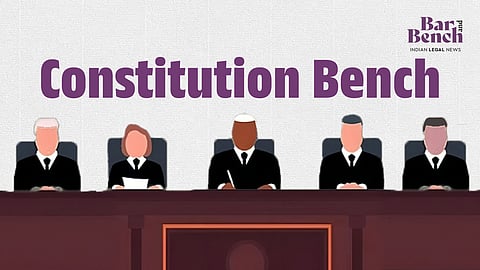
- Latest Legal News
- News
- Dealstreet
- Viewpoint
- Columns
- Interviews
- Law School
- Legal Jobs
- हिंदी
- ಕನ್ನಡ

The Supreme Court of India celebrates 75 years of existence this year. As the celebration subsides, we ought to face ourselves with some difficult questions.
One question which comes to mind is whether the Supreme Court of India, vested with the power to be the final interpreter of the Constitution, has treated this power with utmost priority.
Conversely, has the Supreme Court, owing to its immense workload, deprioritised its primary role as the final interpreter of substantial questions of law relating to the Indian Constitution?
Constitution of Constitution Benches in India
Article 145(3) of the Constitution states that a minimum number of five judges shall sit to adjudicate over a substantial question of law in relation to the interpretation of the constitutional text. According to the Constituent Assembly debates dated June 6, 1994, Sir Alladi Krishnaswami Ayyar very rightly pointed out that the whole thought behind the constitution of these benches was to compartmentalise and save judicial time.
The main idea was to constitute separate benches of 5 or more judges when a reference is made from a three-judge bench to exclusively adjudicate on substantial questions of law relating to the constitutional text and to balance the apex court’s time in adjudicating other cases before it.
These benches have now been commonly referred to as Constitution Benches, which have laid down important canons of Indian constitutional jurisprudence over the past 7 decades.
The curious case of suspended rights
As per the Constitution Bench Time Tracker maintained by the Justice, Access and Lowering Delays in India (JALDI) Initiative by Vidhi Centre for Legal Policy, as of February 12, 2025, there are 28 cases and 238 connected matters where the constitution of an appropriate bench is pending.
What makes these numbers all the more alarming is the fact that the tracker also calculates the average pendency to be around 2,347 days, which amounts to 6.4 years from the initial date of reference.
Additionally, almost 5 cases referred to a Constitution Bench are pending for more than 10 years; the oldest case in this category has been pending for 25 years.
Moreover, the constitution of a review bench for the famous Sabarimala case wherein the Supreme Court prohibited the practice of excluding menstruating women from temple entry is pending with the highest number of tagged matters (65 tagged matters).
Apart from these delays in the constitution of the said benches, it has to be noted that there are also cases where benches have been constituted in the past, but they had to be reconstituted for other administrative reasons such as judges retiring.
These statistics are quite alarming for the health and spirit of transformative constitutionalism in India for two main reasons.
First, the pendency of Constitution Bench cases creates a chilling effect on the rights that may accrue from the interpretation of a particular text/fundamental rights in the Constitution. For example, the Sabarimala case seeks to reconcile Article 14 pertaining to equality and Article 25 pertaining to freedom of religious practice. This is crucial for the advancement of gender rights in the form of bringing equality reforms to religious practice in India. The right accruing from this case remains suspended in air, till the course of the final interpretation.
Second, due to the delay in the constitution of some benches like in the cases of demonetisation, abrogation of Article 370 and the electoral bonds case, the questions raised in the case have turned into mere academic propositions. The questions involved have become fait accompli, leaving the Court no option but to retrospectively reprimand the action of the government.
For example, the Supreme Court allowed the introduction of electoral bonds by neither staying the scheme nor taking up the matter with haste, despite being immediately challenged in 2018, the same year of its notification. Consequently, the Supreme Court held that the electoral bonds scheme was unconstitutional 5 years after the 2019 general elections and 6 years after the initial notification of the scheme.
Need for an objective mechanism to list Constitution Bench matters
Thus, it is clear from the aforementioned analysis that the delay and pendency of Constitution Bench matters have far-reaching implications not only on the rights accrued, but also on the overall health of democracy. Time is of the essence in these matters.
At present, the listing of Constitution Bench matters lies solely in the hands of the Chief Justice of India, who is considered as the master of the roster.
There is a need for an objective and time-bound criteria to list and decide Constitution Bench matters. A clearance system needs to be evolved by the judiciary to keep the listing and disposal of such matters in check.
This is crucial to melt the amber around the substantial questions of law and the rights accruing from them. It is indeed time to retrieve these Constitution Benches from the cold storage of the Supreme Court.
Prathiksha Ullal is a Research Fellow at Vidhi Centre for Legal Policy.
(This article is the second in a series by the JALDI (Justice, Access, and Lowering Delays in India) initiative at the Vidhi Centre for Legal Policy, analyzing the significance and functioning of Constitution Benches at the Supreme Court.)